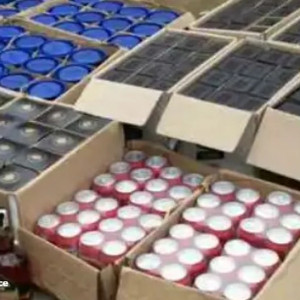Canacona Emerges as Key Hub for Liquor Smuggling into Karnataka via Road, Rail, Sea and Forest Routes


Canacona, a coastal gem at the southern tip of Goa, is popular for its pristine beaches, dense forests and easy pace of life. But beneath the idyllic surface lies a thriving, decades-old trade that has turned the region into a nerve centre for liquor smuggling into neighbouring Karnataka. Despite check-posts, enforcement bodies, and official raids, the trade endures -- even flourishes -- suggesting not just oversight, but complicity.
Locals allege that officers from the Excise, Police and Forest departments have for decades turned a blind eye, allowing the trade to embed itself deep into the region's fabric. Repeated attempts byO Heraldoto seek responses from the Excise Commissioner and South Goa's SP drew a blank. Smugglers have established several secret routes to transport liquor from Goa to Karnataka.
National Highway 66 is one of the main routes used for smuggling. Despite the presence of check posts, vehicles carrying illicit liquor often go unchecked, especially at night. The border gate managed by the Canacona Police is reportedly left open to allow these vehicles through.
The liquor is usually loaded at a nearby distillery run by a person previously accused in multiple liquor smuggling cases in Goa and Gujarat. Konkan Railway Tunnel at Peddem-Loliem, which ends in Mudgeri (Karnataka), is another such route used by dozens of individuals to carry liquor on foot from a distillery in Goa to Karwar. They work under a main dealer based in Karwar, who then distributes it in Karnataka.
Local inquiries revealed that smugglers have access to train schedules and even know how to control the tunnel lights, switching them on and off while transporting liquor. The sea route via Pollem Beach presents another breach point. Despite a major bust involving a liquor-laden boat, officials failed to intercept the vessel itself.
Three people were arrested, but one smuggler and the boat managed to escape. This route has been used since the 1980s due to the lack of coastal security. Sources say the liquor is often transported as far as Mangalore using the sea route.
Meanwhile, the forests of Cotigao Sanctuary offer a convenient backdoor. Liquor-laden vehicles reportedly pass through the Hattipaul check-post unchecked. Inside the forest, goods are offloaded and picked up across the border.
Forest staff maintains that the checkpoint is under their jurisdiction, but raids -- when they happen -- are almost always police-led. In the past, SP Tikam Singh Verma oversaw successful seizures here, but such efforts remain isolated. Despite multiple routes being exposed -- road, rail, sea, and forest -- enforcement remains patchy at best.
What began decades ago as a cross-border hustle has today evolved into a sophisticated supply chain with minimal fear of consequences. With little coordination between agencies and almost no political will, the liquor trade in Canacona has become more than an illicit activity -- it's a symbol of governance that looks away. NH-66 (Primary Highway Route):Night-time vehicle smuggling facilitated by unmanned checkposts
Peddem-Loliem Konkan Railway Tunnel Route:Foot carriers manipulate tunnel lights manipulated; direct link to Mudgeri (Karnataka) Pollem Beach (Sea Route):Boats ferry liquor as far as Mangalore. Minimal coastal policing has helped keep the route active since 1980s
Cotigao Forest (Sanctuary Route):Vehicles pass unchecked through Hattipaul checkpoint and offload liquor near border NH-66 (Primary Highway Route):Night-time vehicle smuggling facilitated by unmanned checkposts Peddem-Loliem Konkan Railway Tunnel Route:Foot carriers manipulate tunnel lights manipulated; direct link to Mudgeri (Karnataka)
Pollem Beach (Sea Route):Boats ferry liquor as far as Mangalore. Minimal coastal policing has helped keep the route active since 1980s Cotigao Forest (Sanctuary Route):Vehicles pass unchecked through Hattipaul checkpoint and offload liquor near border
Liquor-laden vehicles reportedly pass through the Hattipaul check-post unchecked. Inside the forest, goods are offloaded and picked up across the border. Forest staff maintains that the checkpoint is under their jurisdiction, but raids -- when they happen -- are almost always police-led.
In the past, SP Tikam Singh Verma oversaw successful seizures here, but such efforts remain isolated. Despite multiple routes being exposed -- road, rail, sea, and forest -- enforcement remains patchy at best. What began decades ago as a cross-border hustle has today evolved into a sophisticated supply chain with minimal fear of consequences.
With little coordination between agencies and almost no political will, the liquor trade in Canacona has become more than an illicit activity -- it's a symbol of governance that looks away.